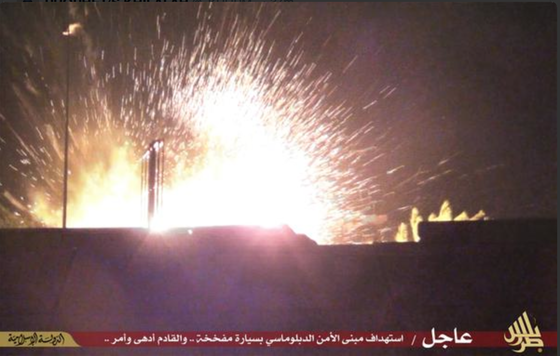The Islamic State's "provinces" in Egypt and Libya claimed recent attacks in both countries via jihadist supporters earlier today. The group's claims of responsibility were first obtained and translated by the SITE Intelligence Group.
The Islamic State's Wilayat Sinai, or Sinai province, publicized that its operatives were responsible for the Dec. 23 attack on a natural gas pipeline that runs into Jordan. The organization said the attack was retribution for Jordan's "participation in the war on the Islamic State" in Iraq and Syria.
Wilayat Sinai's claim of responsibility was published in tweets by the Islamic State's supporters. Twitter has repeatedly suspended Wilayat Sinai's accounts, forcing the group to distribute its propaganda through other sites.
The Wilayat Sinai also claimed responsibility for two attacks on Egyptian military vehicles, saying that the personnel in one of them were killed.
On Dec. 24, the day after the gas pipeline bombing, the Islamic State claimed to have shot down a Jordanian warplane in Raqqah, Syria. CENTCOM quickly disputed the Islamic State's account, saying that the group did not shoot down the bomber.
Whatever the circumstances surrounding the downing of the plane, the group captured the Jordanian pilot flying it and is holding him hostage.
Separately, as SITE reports, the Islamic State's Wilayat Tripoli claimed to have detonated a car bomb at the diplomatic security building in Tripoli. Islamic State supporters have posted a photo, seen on the right, that purportedly shows the bombing.
Attacks on Egyptian pipelines first claimed in name of al Qaeda, now the Islamic State
The Islamic State's Wilayat Sinai grew out of Ansar Bayt al Maqdis (ABM). On Nov. 10, an unidentified ABM leader swore allegiance to the Islamic State's emir, Abu Bakr al Baghdadi. Shortly thereafter, the group was rebranded as an official subsidiary of Baghdadi's enterprise.
Jihadists have executed numerous attacks on pipelines running from Egypt into Israel and Jordan since the political uprising first began in 2011. Initially, ABM's attacks were claimed in the name of al Qaeda and, in turn, al Qaeda's senior leadership praised the group.
In an August 2011 audio message, for instance, al Qaeda emir Ayman al Zawahiri lauded the gas pipeline attacks, which ABM claimed as its own. "Not only does the siege of Gaza continue, but also continues the provision of Israel with Egyptian gas at prices lower than the market price," Zawahiri said in the al Qaeda production. "Were gas sold to Israel at a price higher than the market price, it would be a crime. What can [you] then say about this compound crime?!" Zawahiri continued: "I here commend the heroes who blew up the gas pipeline to Israel. I ask Allah to reward them for their heroic act, for they have expressed the anger of the Islamic Ummah against this continuing crime from the reign of Hosni Mubarak to the rule of the Military Council...."
Zawahiri praised other ABM attacks and the group's "martyrs" as well. In January 2014, the al Qaeda leader directed part of his message "to our people in Sinai." A clip from an ABM video, showing a funeral for some of its members, was included in this section of Zawahiri's message.
[For more on the early ties between ABM and al Qaeda, see LWJ report: Al Qaeda's expansion into Egypt.]
However, ABM has suffered significant leadership losses over the previous year. And those losses reportedly led to a schism in the group between its Sinai-based fighters and the organization's Nile Valley leadership.
There have been disputes within ABM concerning the rivalry between the Islamic State and al Qaeda. An alleged ABM statement pledging loyalty to Baghdadi was quickly disavowed in early November, only to have the Sinai-based wing of the group officially swear fealty to the Islamic State leader less than two weeks later.
Citing Western officials "familiar with intelligence reports on the group's internal communications," The New York Times reported that while the Sinai contingent has been in favor of allying with the Islamic State for months, "some of the Nile Valley leadership remains loyal to Al Qaeda in its theoretical disputes and rivalry with the Islamic State."
Recently, a previously unknown group of jihadists in the Sinai rejected ABM's allegiance to Baghdadi, claiming that the Sinai remains open for other jihadists to operate in as well. In addition, Ajnad Misr, another Egyptian jihadist group, appears to be tied to al Qaeda's international network. Ajnad broke off from ABM earlier this year.
Still, a group of jihadists in the Sinai clearly remains loyal to Baghdadi and continues to execute attacks in the Islamic State's name.
